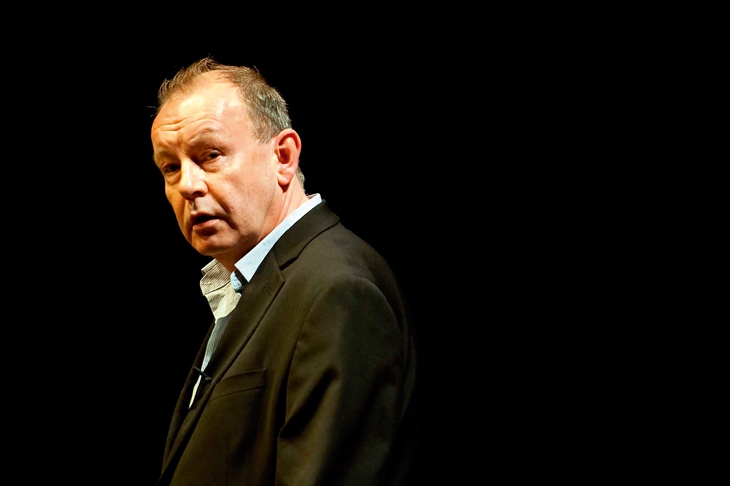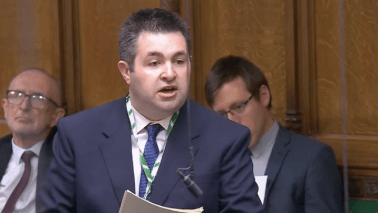He looks like an absent-minded watchmaker, or a homeless chess champion, or a stray physics genius trying to find his way to the Nobel Prize ceremony. He’s in his early sixties, tall and stooping, a bit thin on top, wearing a greatcoat and a crumpled polo-neck jumper. A blur of whiskers obscures the line of his jaw. He has a bulbous, Larkinesque skull and battleship-grey teeth; and if you wanted to cast someone as Spooner, the literary vagrant in Pinter’s No Man’s Land, you’d struggle to find a closer match. This is Michael Boyd, former director of the RSC, who was knighted in 2012 for services to drama. We meet in a dressing-room in a west London studio where he’s rehearsing the Cherry Orchard for Bristol Old Vic.
He has deep roots in the Russian theatre. After graduating in the 1970s, he studied directing at the Malaya Bronnaya Theatre in Moscow before taking up a post as assistant director at the Belgrade Theatre in Coventry. Yet he has never before directed Chekhov. He dislikes seeing the plays done in a ‘floppy-hatted English style, all atmosphere, not properly rooted in place’. During his earlier career, when he ran the Tron Theatre, in Glasgow, he found ‘there was no need to programme Chekhov, I was happy to let others do it.’ He rates the play as Chekhov’s finest and he likens it to Lear. ‘Each author puts humanity to the most extreme test. Under the most extreme sandblaster that he can produce, he winnows humanity to the bone. The poetry of the writing is spare and simple — in the same way that Picasso gets to the root of humanity and, with a very few gestures, captures what it’s like to live in a human skeleton with a beating heart and living muscles.’
Unsurprisingly, he was given an open brief by Tom Morris who runs Bristol Old Vic. ‘Do it the way you want it,’ was his only instruction. I ask for some rudimentary details about his approach. Will it be in period or contemporary costume? He pretends, perhaps playfully, that he hasn’t yet finalised this decision, and he changes the subject by telling me about a version of Turgenev’s A Month in the Country staged in Russia. ‘I was invited to the dress rehearsal, which began informally with the cast in jeans and open-necked shirts, very relaxed behaviour. But as the plot intensified, the actors started to put on parts of their formal costumes. The lovers got trapped, and so on came the corsets and the wigs and they ended up in period costume, as if they were in prison. There was one actor, very bald, who looked absolutely trapped in his wig. I thought, “this is genius!” But then I went to the first performance, and it was in period dress from the word go.’
He got into directing by accident or perhaps by instinct. As a student actor he had far stronger opinions about the production than the rest of the cast. ‘I was perhaps quite annoying,’ he admits. He can detect signs that an actor has potential as a director ‘if they come up with great ideas in rehearsal or offer advice to less experienced cast members’. He says the best actors ‘are their own best editors, able to get under the skin of the character, and make choices at high speed’.
I ask about the changes he’s witnessed over a 40-year career in the theatre, and he assumes (wrongly) that I’m fishing for good news. ‘Actors and directors are more likely to come from a wider variety of backgrounds so there are more voices, more stories being told. And theatre has very nimbly absorbed influences from other creative forms — from art, from sculpture, from film, — so the level of visual skills is terrific.’ It takes me quite an effort to coax him on to negative territory. ‘The slightly toxic obsession with celebrity culture is not always a benign influence,’ he says. And he talks of over-conceptualised shows in these terms. ‘The problem with some productions is that you feel this isn’t telling the story, it’s telling the story of its own theatricality.’ He mentions the Arts Council’s budget and the cuts to regional theatres that started to bite deeply after 2010. But even there he finds cause for optimism. ‘It’s made them focus on different ways of appealing to their community.’
His schedule is booked up for at least two years. He recently directed a macabre comedy, The Open House, at the Print Room in Notting Hill. In 2020 he’ll revive his production of Tchaikovsky’s Eugene Onegin at Garsington. This autumn he’s directing a new show, The Circle, at the Dorfman. It’s a musical based on a David Eggers novel about a digital future in which the social-media giants have merged into a vast, oppressive monopoly. He seems drawn to nightmarish and morbid themes in drama, and he talks of The Cherry Orchard as a dystopian vision of the terrible changes that were about to engulf Russian society.
‘There’s a tremendous sense of new money taking over. The cherry trees will be chopped down and replaced with a great new estate. So the play is about how to bring about change in a deeply unequal world, and how to cope with that change.’ He says this resonates with today’s political culture. ‘In the play you hear the voice of the disenfranchised knocking on the door and threatening privilege in a way that liberalism is under threat, or is reported to be under threat, throughout the western world.’ He says this reflects ‘the conversation around privilege [that is] going on throughout the UK.’ The play may even foment discussions about Britishness. ‘What is Britain, what is Englishness, after Europe?’
He seems closely engaged with UK politics and he describes our current socioeconomic structure as ‘skew-whiff’. He’s aggrieved by ‘obscene bonuses’ and by the income gap between the chief executives and the auxiliary staff at large firms. His solution is redistributive taxation which he says, perhaps optimistically, must be ‘done cleverly’. I ask if he favours a maximum wage? ‘Yes’. My next question is easy. ‘More or less than what you earn?’ ‘Oh, more,’ he shrugs, ‘and a damn sight more than I earned at the RSC.… Millions!’ Oddly, he seems Mandelsonian in his attitude to the accumulation of large personal fortunes. Then the crunch question. ‘Will Jeremy Corbyn win?’ ‘I hope so.’







Comments